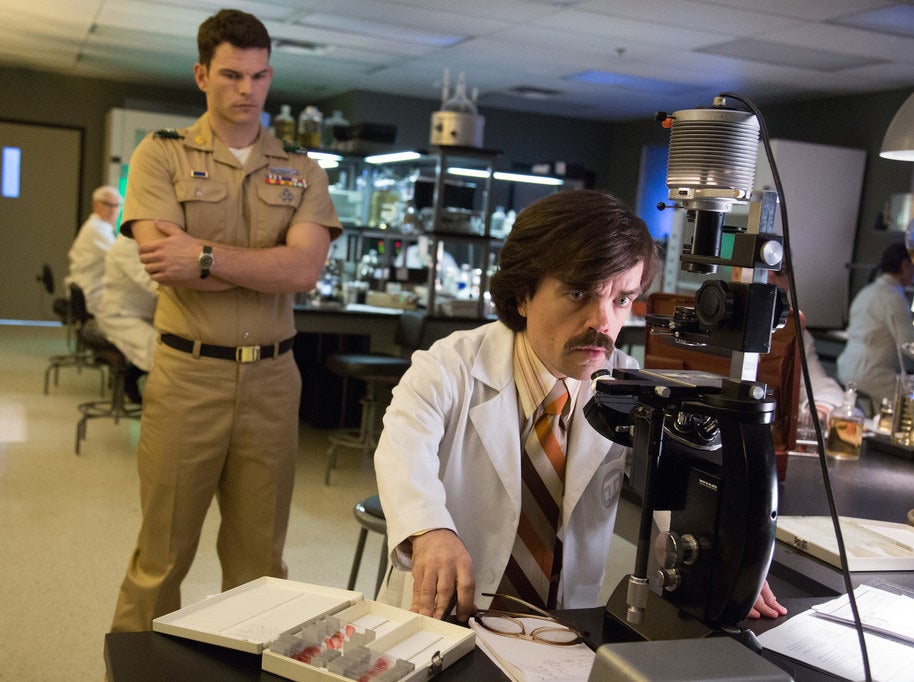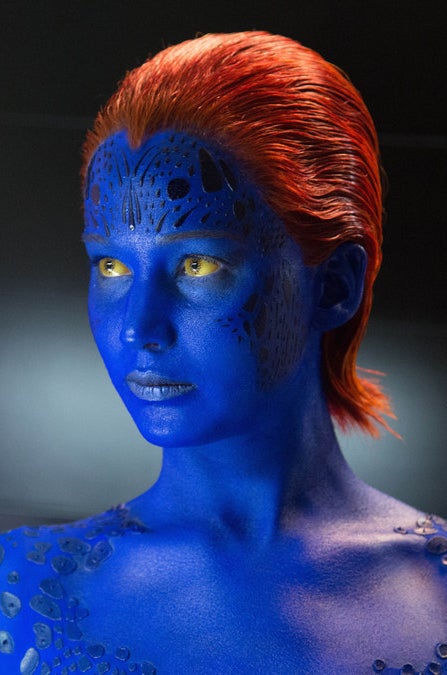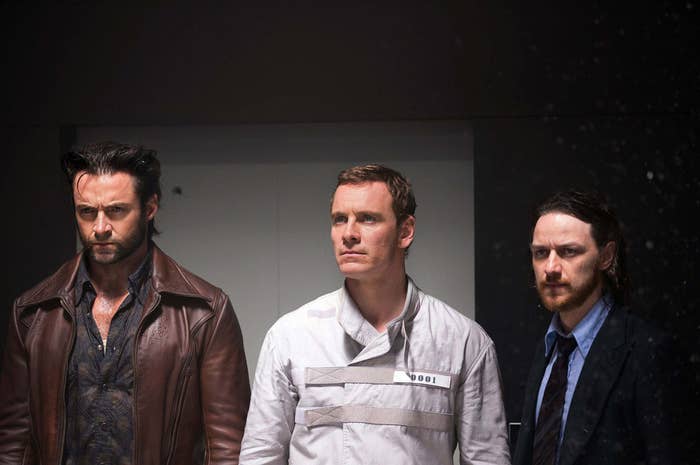
Adam B. Vary: We begin our conversation with something of a confession, Jace: I have never counted myself as much of a reader of the X-Men comics books. Nonetheless, I was well aware when walking into X-Men: Days of Future Past with you that I was about to watch an adaptation of perhaps the second most coveted storyline in comic franchise's history. Second, of course, to the Dark Phoenix storyline. And given how furious my X-Men comics fan friends were about how 2006's X-Men: The Last Stand treated the Dark Phoenix story — and, frankly, how bad that movie was in general — I was prepared for this movie to be similarly disappointing, for me, and for you, a major X-Men comics fan.
But I was not disappointed! I wasn't close to being overwhelmed, either, but I did enjoy the movie on its own terms as a piece of well-crafted superhero cinema. Did you?
Jace Lacob: I feel deeply conflicted about it. It is a bit of spectacle, yes, with some nice special effects, but it didn't coalesce into something powerful or moving for me, which is somewhat depressing given the source material. Days of Future Past is definitely up there with the Dark Phoenix Saga and God Loves, Man Kills as some of the most significant and powerful stories in the X-Men canon. But this felt, ultimately, somewhat toothless.
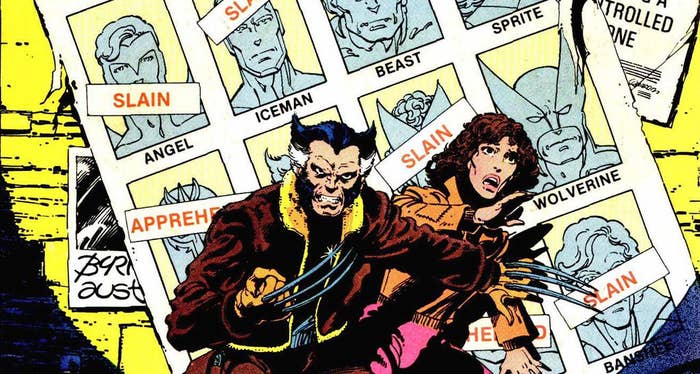
ABV: Strong words! I know that the Days of Future Past comic is often enormously grim — and the film certainly starts out that way, with shots lingering on piles of dessicated and decaying corpses amid a concentration camp in New York's Central Park. And there are some shocking deaths in the first reel — which are, no real spoiler here, quickly done away with thanks to some of Kitty Pryde's time-travel mojo. But the film quickly becomes something of a zippy and rousing time-travel adventure, with James McAvoy's Charles Xavier doing all of the angsty heavy lifting with a rather on-the-nose heroin addiction metaphor.
JL: Yes, Xavier's addiction metaphor was way too obviously structured, and provided a way too overt crucible for the man who is meant to be the moral compass of the franchise. I want to address the strangeness of Kitty's new power set in a bit. But what the film accomplishes is diminishing the raw power of the original plot, which is rooted in a Holocaust analogy. The stakes are high in both the comic and the film, and we see that single shot of a concentration camp in the opening sequence, but the metaphor is quickly dissipated. In the comic, we're forced to experience the reality of the survivors in the concentration camp in the future, survivors who are branded with clothes that immediately identify them as mutants, much like the yellow star in Nazi Germany. They're fighting for their very survival and against extinction.
The film, however, isolates this largely by making the Sentinels the symbolic force they're battling: unseen, uncaring automatons with whom they engage in some pyrotechnic-heavy skirmishes before being whisked away… or undone altogether, thanks to Kitty's abilities. (In the comics, they're seeking to prevent a nuclear disaster unleashed by Europe upon the U.S. and battling Sentinels who have taken over North America. Trask here is little more than a figurehead.) Other than that first shot, the concentration camps aren't seen or mentioned. The action is far removed from these places of death, set in Moscow or a cliffside village in China. As a result, there's less of an urgency and a sense that humanity's errors repeat themselves.
ABV: Once Wolverine is zapped back to 1973, it becomes pretty clear that the stuff in the future is far less central to the film than the stuff in the past. Which I'm actually totally fine with — outside of Ian McKellan and Patrick Stewart, I find the prequel cast to be far more engaging, especially Jennifer Lawrence's Raven/Mystique. I also appreciated that no one even hints at the fact that Peter Dinklage's Bolivar Trask is a dwarf — the contrast is self-evident, and Dinklage's performance is otherwise agreeably understated. My favorite section may be all the stuff with Quicksilver (Evan Peters); he's just great fun, an increasingly rare commodity in superhero movies that aren't made by Marvel Studios.
JL: Well, for a film about people with visible and invisible differences, I really felt like it was an odd choice that no one singles out Dinklage's Trask for his own difference. (Intentional perhaps, but it struck a strange chord.) But I do agree that Lawrence is incredible here as Mystique, whose sense of morality has been perhaps inexorably compromised. Peters' Quicksilver is a lot of fun and adds some dynamic visuals, but then he disappeared without a trace! (OK, fine. He appears in one quick cut later in the film, but still.)
ABV: It did seem odd that someone so useful is left at home for the rest of the film, but he is just a teenage boy, and Xavier is, at his core, most interested in the welfare of children. But I want to get at the fundamental theme of this movie — which, it seems, deviates from the theme of the Days of Future Past comics: namely, the importance of persecuted minorities to live openly, and attempt to live in harmony, with those who would oppress them.
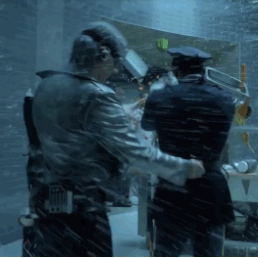
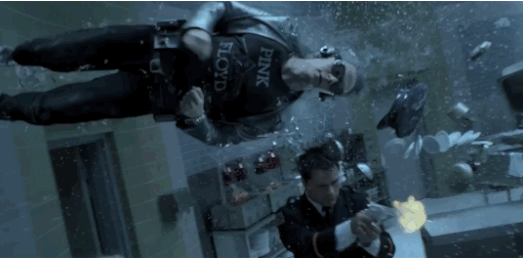
JL: That's always been a core principle of the X-Men and an important one: For a group of people that are feared and hated by those representing baseline "normalcy," what does it mean to live in the open? There's a sequence in the film that I found especially telling — and considering the issues swirling around director Bryan Singer right now, really prescient and intriguing — in which Mystique and Nicholas Hoult's Beast are photographed by the media in their true forms. The notion of having one's true face in front of the cameras, of being revealed for what you are, of being outed, seems really relevant right now.
ABV: You know, I agree and disagree with that. At the risk of getting too far off on a historical tangent, I kept thinking throughout the movie about how the 1970s was a period of growing visibility and political power for LGBT people, especially in major urban centers — and how AIDS is often believed to have set back the movement by a decade at least. Singer has made no secret of how he sees these films as an explicit allegory to LGBT rights — there's that great scene in X2 where Iceman's mom asks him if he's ever tried not being a mutant. But with LGBT rights making such amazing strides in the last few years, a movie largely stuck in the past that is about attempting to avoid a horrific future — a horrific future we don't seem to be living now, at least from an LGBT perspective — feels a bit off to me? Certainly, the Holocaust metaphor in Days of Future Past had much more relevance in the 1980s at the height of the AIDS crisis. Or maybe I'm just placing too much cultural weight on a comic book movie.
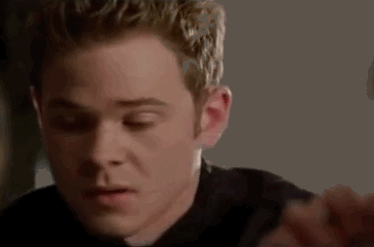
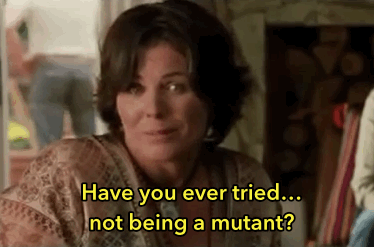
JL: Well, there was actually a metaphor for the AIDS crisis within the comics — the Legacy Virus, which was killing mutants rapidly before spreading to the general population. And the X-Men have certainly offered a stand-in for any persecuted minority group; they represent the spirit of inclusiveness — creating your own family, rather than inheriting one, etc. This storyline ran at the height of 1980s Reagan-Thatcherism, the Cold War, and the Star Wars weapon systems, amid a vastly materialistic society in which normalcy seemed to be the ultimate prize to be attained.
In the comic, Kitty Pryde is a 13-year-old Jewish teenager who finds her place in the world by joining a group of misfits with abilities that often cause terror in "norms." That her older, wiser, hardened persona is sent back in time into the body of her naive and innocent 13-year-old self within Chris Claremont's original plot is significant: There's something to be said for the horrors of war and deprivation and what they do to a person. (We see how those horrors play out within the future versions of Wolverine, Storm, Colossus, Magneto, and others.) The fact that they're fighting against the Mutant Registration Act is also important; their struggles are that of civil rights in a world that doesn't understand them or their self-identification. Additionally, it's absolutely intentional that Kitty is Jewish in a story that functions as a metaphor for the Holocaust, but it's Wolverine who gets sent back in the film, largely because Hugh Jackman has to be the star of this film.
ABV: And if Singer's "gay male gaze" ever announces itself in this film, it's with the first scene of Wolverine arriving in 1973. (Spoiler alert: Logan be nekkid.) But you've teased me with a discussion of Kitty Pryde and her powers — I also know she is a figure of deep affection for many fans, so do you think she was used well in the film? Certainly it's nice to see Ellen Page on screen again!
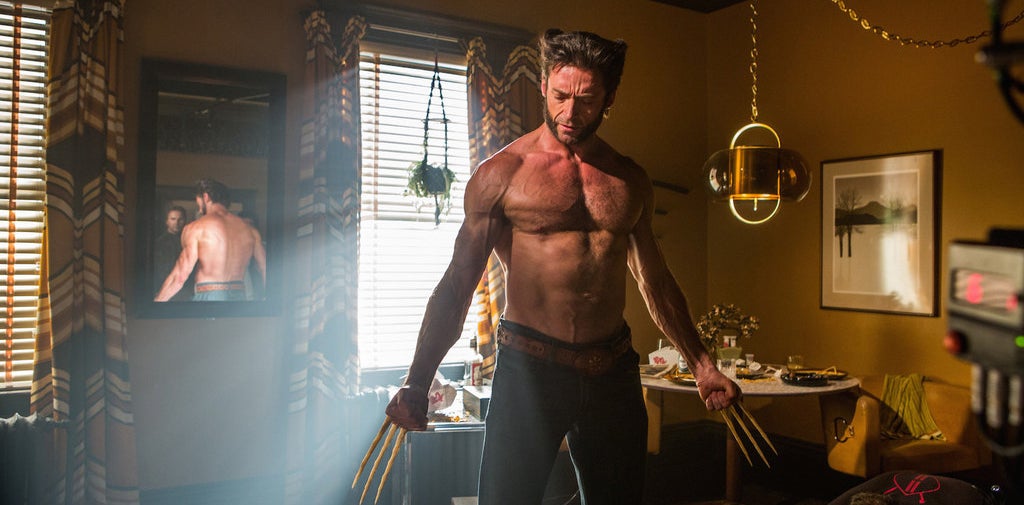
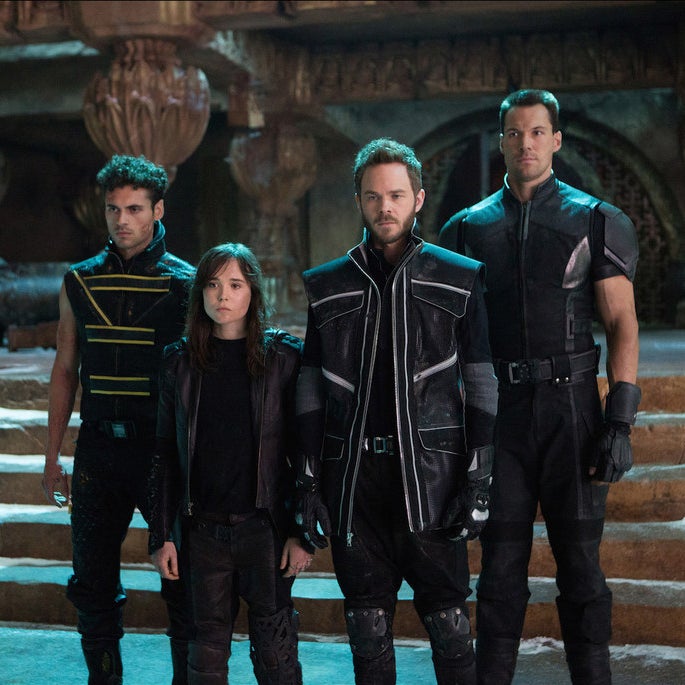
Hugh Jackman (left); and Adan Canto (as Sunspot), Ellen Page (as Kitty Pryde), Shawn Ashmore (as Iceman), and Daviel Cudmore (as Colossus) in X-Men: Days of Future Past
JL: I love Ellen Page and I have a particular affection for Kitty Pryde as well. Was she used effectively here? That's debatable. She functions largely as a prop within the story, a convenient power set that is not explained at all within the larger context of the time-travel plot. Her power is intangibility: We're given a great visual for this as she and Bishop (Omar Sy) speed through walls in order to enter a vault. But how exactly does Kitty send people's consciousnesses back through time? By phasing through time and space? It's not explained at all and it's strange. It's what immediately took me out of the plot because it just didn't make any sense to me at all.
ABV: I have always been amused by comic book fans who say that someone's powers don't make sense, because this is a world in which a man can levitate an entire stadium and drop it over the White House.
JL: Ha. Yes, but there needs to be an internal logic at work. If you can levitate an entire stadium, can you suddenly also shape-shift?
ABV: We're going to get nowhere debating "internal logic" in regard to a world in which characters are largely given powers that are useful in battle but have no precise biological imperative. (Don't take the bait, Jace!) But I think your point speaks to a larger tension within feature film adaptations of comic books, namely that filmmakers feel like they have far more leeway with changing plots, characters, and locations than the filmmakers of, say, the Harry Potter movies, or the Hunger Games films. The internal continuity within these X-Men movies is already a complete mess — like, is anyone going to explain how Magneto got his powers back after the end of X-Men: The Last Stand, or how Prof. X came back to life? But I gather that the films have made mincemeat of so many beloved elements of the comics that many fans have thrown up their hands and basically expect to be disappointed. Fair?


Ian McKellan and Patrick Stewart; and director Bryan Singer from X-Men: Days of Future Past
JL: Very fair, really. And I accept that there is a continuity here that isn't necessarily dependent upon decades of continuity from the comics; there are bound to be decisions that leave die-hard fans scratching their heads (Alex Summers, the brother of Scott Summers, is alive in the '60s?) or are just strange decisions to make change for the sake of making change. These films have gotten incredibly convoluted because of spinoffs, reboots, and sequels. Screenwriter Simon Kinberg, who wrote X-Men: Days of Future Past, also wrote X-Men: The Last Stand. Yet, he seems determined to undo a lot of the action of that film. (SPOILER alert!) And Days of Future Past appears (on the surface anyway) to tie off the action and characters from those first three films. Will Iceman, Kitty, etc. appear in X-Men: Apocalypse? It's far more certain that McAvoy and Fassbender will return in the next film, despite the fact that the timeline seems impossibly contorted as a result. (End SPOILER alert!)
ABV: Which I don't mind! Again, my favorite moments in the X-Men movies have been when the characters' powers are used in a way that surprises and delights me — I remember fist-pumping when Magneto draws the iron out of the blood of his prison guard in X2, which is a really disturbing thing to fist-pump over when you think about it, so I'm not going to think about it. When I'm asked to believe in a world with so many fantastical people with so many (Jace bait alert) seemingly arbitrary powers, concerns about internal plot logic take a back seat to concerns about having a good time. I've just never expected the X-Men movies to be as good — as moving — as The Dark Knight, The Avengers, or the very first Superman movie.
JL: But shouldn't we hold them to the same standard?
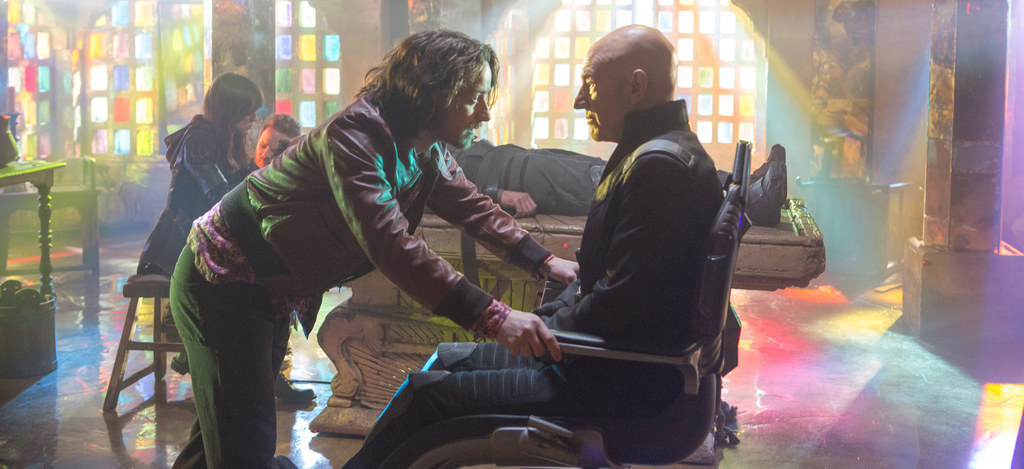
ABV: I'm not sure. Marvel Studios has made clear that superhero movies aren't as much a rigid genre as they are another way to tell stories — be they paranoid political thrillers (like the fantastic Captain America: The Winter Soldier) or quasi-medieval fantasy adventures (like the not-so-fantastic Thor: The Dark World). And I'm more interested in measuring these films against other films like them, which aren't necessarily superhero films. In Days of Future Past's case, I'd compare it both to other X-Men movies — and I think it's one of the stronger of the lot — and time-travel movies — where I think it could have had a lot more fun with the weirdness of moving through time. But that's me, a comic book dilettante. What's your final verdict on this film?
JL: It's a fun diversion, one that doesn't necessarily add up to anything revolutionary or earth-shattering. The lack of logic — about Kitty's powers and how time travel could theoretically work (that future timeline would still exist, albeit as an alternate timeline!) — disappoint. Ultimately, I liked the film, which might be damning with faint praise somewhat. Considering how much Singer is in the news right now, I had expectations that the film would perhaps divert attention away from his legal issues. But I kept thinking about Singer throughout. And that's perhaps not the best thing in a film about people with vast power exacting a power play upon those without.


